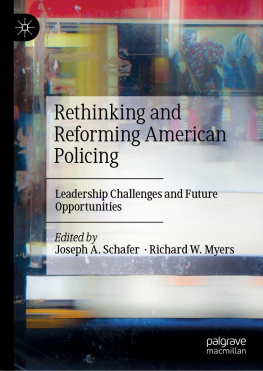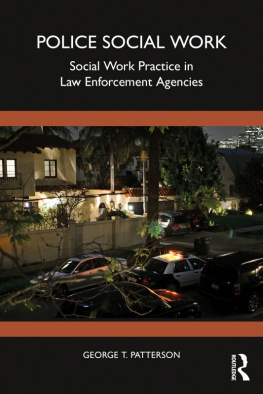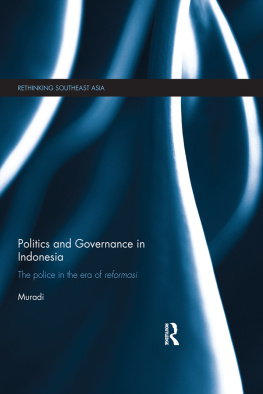
Policing: Toward an Unknown Future
The enclosed chapters are the culmination of a project Dr. John Crank and Dr. Colleen Kadleck carried out assessing issues facing the police into the early 21st century. The chapters are future oriented, in the sense that they anticipate trends visible today. Everywhere, our scholars found that the organizational concept, practice, and function of the police was undergoing transition. Yet, the seeming state-level hardening of the police function was ubiquitous. Two themes were noteworthy. On the one hand, in developing or second world countries, police face endemic problems of corruption, organized crime, and drugs. Police, in response, are undergoing centralization and intensification of law enforcement activities. In countries with first world economies Canada, the United States, and Australia we also see trends toward expansion of the police function, a trend described by Brodeur as toward high policing. It reflects the growing reliance on surveillance for crime control and for the tracking of minority, indigenous, and immigrant populations in crime prevention efforts. We found that governments, sometimes encouraged by their citizenry, seem increasingly to rely on the police to deal with a broad array of social as well as criminal problems.
This book was published as a special issue of Police Practice and Research .
Dr John Crank received his Ph.D. from the University of Colorado in 1987 and is currently employed at University of Nebraska, Omaha in the Department of Criminology and Criminal Justice. His work focuses primarily on police issues, culture, and organizational practices. He has published six books, receiving ACJS outstanding book award for Imagining Justice . He is currently at work on the book Mission-Based Policing, a new model of police structure and practice that integrates current trends and represents a break from traditional calls for service policing deployment practices. He has also published 52 papers in refereed scholarly journals.
Dr. Colleen Kadleck received her Ph.D. from the University of Cincinnati in 2001, and is currently Associate Professor in the School of Criminology and Criminal Justice at the University of Nebraska, Omaha. Her research interests focus primarily on issues in policing and the use of quantitative methods. Currently her work is focusing on the systematic study of police unions and methodological and statistical issues in the measurement of agreement between raters.
Police Practice and Research
Series Editor: Dilip K. Das
International Police Executive Symposium
Police Practice and Research is a series of books based on special issues of the pioneering peer-reviewed journal Police Practice and Research: An International Journal , which presents current and innovative police research as well as operational and administrative practices from around the world. It seeks to bridge the gap in knowledge that exists regarding who the police are, what they do, and how they maintain order, administer laws, and serve their communities. The journal is published in association with the International Police Executive Symposium (IPES), which brings police researchers and practitioners together to facilitate cross-cultural, international and interdisciplinary exchanges for the enrichment of the policing profession.
Policing: Toward an Unknown Future
Edited by John Crank & Colleen Kadleck
Innovative Possibilities: Global Policing Research and Practice
Edited by Les Johnston & Clifford Shearing
Policing: Toward an Unknown Future
Edited by
John Crank and Colleen Kadleck
Series edited by
Dilip K. Das
First published 2011
by Routledge
2 Park Square, Milton Park, Abingdon, Oxon, OX14 4RN
Simultaneously published in the USA and Canada
by Routledge
711 Third Avenue, New York, NY 10017
Routledge is an imprint of the Taylor & Francis Group, an informa business
2011 Taylor & Francis and IPES (International Police Executive Symposium)
This book is a reproduction of Police Practice and Research 10.3. The Publisher requests that those citing this book use the bibliographical details of the journal issue on which the book is based.
Typeset in Times New Roman by Taylor & Francis Books
All rights reserved. No part of this book may be reprinted or reproduced or utilised in any form or by any electronic, mechanical, or other means, now known or hereafter invented, including photocopying and recording, or in any information storage or retrieval system, without permission in writing from the publishers.
British Library Cataloguing in Publication Data
A catalogue record for this book is available from the British Library
ISBN13: 978-0-415-61818-2
Disclaimer
The publisher would like to make readers aware that the chapters in this book are referred to as articles as they had been in the special issue. The publisher accepts responsibility for any inconsistencies that may have arisen in the course of preparing this volume for print.
Contents
| Dilip K. Das |
| John Crank and Colleen Kadleck |
| Adrian Beck and Annette Robertson |
| Christopher Birkbeck |
| Walter S. DeKeseredy |
| Connie M. Koski |
| Anthony P. LaRose and Sean A. Maddan |
| Otwin Marenin |
| Janet Ransley and Lorraine Mazerolle |
| Brad Bartholomew, Jennifer Gibbs, David Mazeika, Eileen Ahlin, Patricia Joseph and Noah Miller |
| John P. Crank, Colleen Kadleck and Connie M. Koski |
Dilip K. Das
Series Editor
I am delighted to write the Series Editor s Preface to the IPES, International Police Executive Symposium, and the Routledge Co-Production, a book series, based on the special issues of Police Practice and Research: An International Journal (PPR). It is an eloquent testimony to the well-known and growing importance as well as global popularity of PPR that a prestigious publishers, Routledge, wrote to me recently to confirm that the special issue journals we have agreed upon from Police Practice and Research shall be turned into a book series as a joint publication with IPES: International Police Executive Symposium. They added that We are very much looking forward to publishing the special issues of your journal as a book series.
Police Practice and Research (PPR) is affiliated with the International Police Executive Symposium (IPES) www.ipes.info. PPR is a peer-reviewed, international journal that presents current and innovative academic police research as well as operational and administrative police practices from around the world. Manuscripts are submitted by practitioners, researchers, and others interested in developments in policing, analysis of public order, and the state of safety as it affects the quality of life everywhere. The journal seeks to bridge the gap in knowledge that exists regarding who the police are, what they do, and how they maintain order, administer laws, and serve their communities in the world. Attention is also focused on specific organizational information about the police in different countries and regions of the universe.








